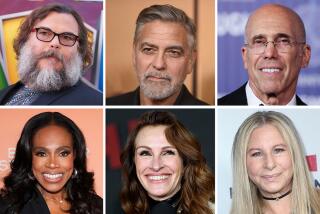Jerry Brown Shifts Focus to Presidency : Politics: The ex-governor drops bid to succeed Cranston in Senate. The theme of his likely White House candidacy is an attack on the ‘entrenched political Establishment.’
Former Gov. Edmund G. (Jerry) Brown Jr. announced Tuesday that he is abandoning his bid for a U.S. Senate seat from California and instead forming a committee to explore a race for the Democratic presidential nomination.
Though Brown did not take the final step of formally declaring his candidacy for President, sources close to him say it is likely he will join the sparse Democratic field after organizing his campaign over the next several weeks. “He knows it will never be easier in his lifetime to win the nomination,” said one close adviser. “Time moves on and this is his moment.”
Brown, 53, announced the formation of his exploratory committee in a 10-page letter to supporters in which he laid out the central theme of his likely candidacy: a blistering attack on the “entrenched political Establishment” in both parties.
In his letter, Brown said he was shifting his focus from the Senate to a long-shot bid for the White House because “there is no national figure who is prepared to enter the presidential race and take on not only George Bush but the entire corrupt system, including those entrenched Democratic politicians who have turned our party from a voice of opposition into a party of complicity.”
To dramatize his case against the influence of special-interest money in politics, the former two-term California governor said he would accept no contributions greater than $100, though federal law allows donations of up to $1,000 for presidential candidates. “If the corruption of political money is the issue then the answer is simply not to take it,” Brown wrote.
With such slashing critiques, Brown--who also sought the party’s presidential nomination in 1976 and 1980--is bound to invigorate the somnolent Democratic debate. Just over five months before the first contest in Iowa, the party has only two announced candidates--former Massachusetts Sen. Paul E. Tsongas and former Irvine Mayor Larry Agran--though Sens. Tom Harkin of Iowa and Bob Kerrey of Nebraska and Govs. Bill Clinton of Arkansas and L. Douglas Wilder of Virginia all are moving closer to the starting line.
If nothing else, Brown’s announcement reconfirmed his reputation as a politician with an infinite capacity to surprise. Since resigning his post as California Democratic Party chairman earlier this year, Brown had been actively exploring a race for the seat being vacated by retiring Democratic Sen. Alan Cranston. But, encouraged by the audience response to speeches condemning the “corruption” of modern politics--and concerned about his prospects of winning the Senate seat--he began to shift his focus to the presidential race this summer.
Some Democrats believe that by offering himself as the reforming outsider in the Democratic presidential field, Brown could tap into a current of voter outrage about corruption and stalemate in Washington. “His message of absolute frustration and anger with the system is exactly at the same point where the average voter in the street is,” said former New Hampshire Democratic Chairman J. Joseph Grandmaison.
But many observers believe Brown faces formidable obstacles establishing himself as a credible vehicle for that message. “I think everybody believes his day has passed,” said Los Angeles Democratic activist Allison Thomas, a former Brown aide. “It’s a great message, but the wrong messenger.”
Out of office since 1982--when he lost a California Senate race to Republican Pete Wilson--Brown is an indistinct figure in much of the country, political operatives say. “I don’t know if Iowans remember him,” said Joe Shannahan, communications director of the Iowa Democratic Party. “After 10 years he’s a blank slate.”
Brown is better known among political insiders, but many are skeptical that he has either the perseverance or political network to launch a serious campaign. Others find it difficult to square his new message of campaign reform with a career of aggressive fund raising. “I tend to be skeptical of foxhole conversions,” said one prominent California Democrat. “This guy was leaning all over me for money when he was state party chairman.”
As he begins an exploratory process that could last about six weeks, Brown characteristically is seeking support in both familiar and unconventional arenas. He has aggressively courted labor leaders--including William H. Wynn, president of the United Food and Commercial Workers, and Richard L. Trumka, president of the United Mine Workers--with the message that only campaign reforms limiting the financial clout of business will allow unions to regain their political strength.
From such disparate strands, Brown will try to braid together what he described in his letter Tuesday as “not merely a campaign but a cause.”
“I do not undertake this exploration to decide what I am prepared to do,” he wrote. “Its purpose is to explore what others are prepared to do.”
POLITICAL EFFECT: Others must ponder the effect of Brown’s decision. A21
More to Read
Get the L.A. Times Politics newsletter
Deeply reported insights into legislation, politics and policy from Sacramento, Washington and beyond. In your inbox three times per week.
You may occasionally receive promotional content from the Los Angeles Times.










